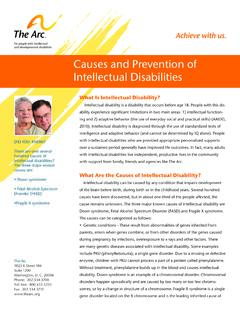Transcription of People with Intellectual Disabilities in the Criminal ...
1 People with Intellectual Disabilities in the Criminal Justice Systems: Victims & SuspectsBy Leigh Ann Davis, W., Do People with Intellectual Disabilities Get Involved in the Criminal Justice System? People with Intellectual , cognitive or developmental Disabilities get involved as both victims and suspects/offenders more often than individuals without Disabilities . Some researchers have found that People with I/DD have a 4 to 10 times higher risk of becoming victims of crime when compared to those without Disabilities (Sobsey, 1994). Children with any type of disability are times more likely to be abused compared to children without Disabilities (Sul-livan & Knutson, 2000).
2 In 2008, The National Crime Victim Survey found that People with Disabilities experience higher rates of violence than People without Disabilities (40 victimizations per 1,000 persons with Disabilities compared to about 20 per 1,000 without Disabilities ), and that the rate of victimization was twice as high for People with Disabilities . Another alarming finding was that People with cognitive Disabilities (or Intellectual Disabilities ) had the highest risk of violent victimization (Harrell & Rand, 2010). Individuals with this disability also constitute a small, but nonetheless grow-ing percentage of suspects/offenders within the Criminal justice system.
3 While those with Intellectual Disabilities comprise 2% to 3% of the general popula-tion, they represent 4% to 10% of the prison population, with an even greater number of those in juvenile facilities and in jails (Petersilia, 2000). One study that looked at the number of People with Disabilities in state and federal pris-ons found that fewer than 1% of inmates had physical Disabilities while had mental retardation (referred to in this fact sheet as Intellectual Disabilities ) (Veneziano & Veneziano, 1996). How Do They Become Victims of Crime? Factors such as impaired cognitive abilities and judgment, physical disabili-ties, insufficient adaptive behaviors, constant interactions with protectors who exploit them, lack of knowledge on how to protect themselves and living and working in high-risk environments increase the vulnerability to victimiza-tion (Luckasson, 1992).
4 Crimes committed against People with Intellectual Disabilities are often la-What Is The Arc s Position? People with Intellectual and/or developmental disabiltiies who are vicitms, suspects or witnesses, like other residents of the United States, have the right to justice and fair treatment in all areas of the Criminal justice system, including reasonable accomdations as necessary. Read the full Position Statement at become an effective advocate, read The Arc s Justice Advocacy Guide at + Arc1825 K Street NWSuite 1200 Washington, D. C. 20006 Phone: free: : For more information on this and other topics, visit as abuse and neglect (rather than assault, rape or murder), which understates the Criminal vic-timization problem.
5 Many victims with Intellectual Disabilities may not report crimes because of their dependence on the abuser for basic survival needs. When victims do report crimes, police and court officials may not take the person s allegations seriously or be reluc-tant to get involved. Additionally, People with Intellectual Disabilities often don t have access to the types of support and resources they need to Types of Crime Do People with Intellectual Disabilities Commit? Some People with Intellectual Disabilities commit crimes, not because they have below-average intelligence, but because of their unique personal experiences, en-vironmental influences and indi-vidual differences.
6 During the early 1900s, some professionals believed that individuals with Intellectual Disabilities were predisposed to becoming criminals due to their disability. This view lost support during the 1930s when its lead-ers rescinded their original beliefs and the focus on causes of crime shifted from biological reasons to psychological and sociologi-cal ones. Research from the mid-80s to the 1990s found that the types of crime committed range from property crimes, like theft or robbery, to physical and sexual assault. Some have been accused of murder as well. One researcher found that many who committed sexual offenses were victimized sexually, and that their experience as a victim was linked to their later experience as the offender (Firth, 2001).
7 What Problems Do They Face as Victims or Suspects? Almost all People with intel-lectual Disabilities now live in the community and are susceptible to becoming involved in the Criminal justice system as suspects and/or victims. As suspects, individuals with this disability are frequently used by other criminals to assist in law-breaking activities without understanding their involvement in a crime or the consequences of their involvement. They may also have a strong need to be accepted and may agree to help with Criminal activities in order to gain friendship. Many individuals unintentionally give misunder-stood responses to officers, which increase their vulnerability to arrest, incarceration and possibly execution, even if they committed no crime (Perske, 2003).
8 Considering such extreme dis-advantages, it is not surprising that People with Intellectual disabili-ties are more likely to be arrested, convicted, sentenced to prison and victimized in prison. Once in the Criminal justice system, these individuals are less likely to receive probation or parole and tend to serve longer sentences due to an inability to understand or adapt to prison rules. Some common responses from those with intel-lectual Disabilities that may affect their ability to protect their rights include the following:As suspects, individuals may: not want their disability to be rec-ognized (and try to cover it up) not understand their rights but pretend to understand not understand commands, in-structions, etc.
9 Be overwhelmed by police pres-ence act upset at being detained and/or try to run away say what they think officers want to hear have difficulty describing facts or details of offense be the first to leave the scene of the crime, and the first to get caught be confused about who is re-sponsible for the crime and con-fess even though innocentAs victims, individuals may: be easily victimized and targeted for victimization be less likely or able to report victimization be easily influenced by and eager to please others think that how they have been treated is normal and not realize the victimization is a crime think the perpetrator is a friend be unaware of how serious or dangerous the situation is not be considered as credible witnesses, even in situations where such concern is unwarranted have very few ways to get help.
10 Get to a safe place or obtain victim services or counselingAre People with Intellec-tual Disabilities Exempt from the Death Penalty? The Supreme Court issued a landmark ruling prohibiting the execution of individuals with Intellectual Disabilities on June 20, 2002. In its 6-3 decision on Atkins v. Virginia, the Court held that it is a violation of the Eighth Amend-ment ban on cruel and unusual punishment to execute death row inmates with Intellectual disabili-ties. However, the Court did not specify what is meant by mental retardation so each state must determine how it will be defined.










